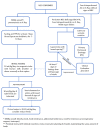Optimizing Nutritional Strategies to Prevent Necrotizing Enterocolitis and Growth Failure after Bowel Resection
- PMID: 33498880
- PMCID: PMC7910892
- DOI: 10.3390/nu13020340
Optimizing Nutritional Strategies to Prevent Necrotizing Enterocolitis and Growth Failure after Bowel Resection
Abstract
Necrotizing enterocolitis (NEC), the first cause of short bowel syndrome (SBS) in the neonate, is a serious neonatal gastrointestinal disease with an incidence of up to 11% in preterm newborns less than 1500 g of birth weight. The rate of severe NEC requiring surgery remains high, and it is estimated between 20-50%. Newborns who develop SBS need prolonged parenteral nutrition (PN), experience nutrient deficiency, failure to thrive and are at risk of neurodevelopmental impairment. Prevention of NEC is therefore mandatory to avoid SBS and its associated morbidities. In this regard, nutritional practices seem to play a key role in early life. Individualized medical and surgical therapies, as well as intestinal rehabilitation programs, are fundamental in the achievement of enteral autonomy in infants with acquired SBS. In this descriptive review, we describe the most recent evidence on nutritional practices to prevent NEC, the available tools to early detect it, the surgical management to limit bowel resection and the best nutrition to sustain growth and intestinal function.
Keywords: bowel sparing; human milk; necrotizing enterocolitis; nutrition; short bowel syndrome; surgical management.
Conflict of interest statement
The authors declare no conflict of interest.
Figures


References
-
- Merritt R.J., Cohran V., Raphael B.P., Sentongo T., Volpert D., Warner B.W., Goday P.S. Nutrition Committee of the North American Society for Pediatric Gastroenterology, Hepatology and Nutrition. Intestinal Rehabilitation Programs in the Management of Pediatric Intestinal Failure and Short Bowel Syndrome. J. Pediatr. Gastroenterol. Nutr. 2017;65:588–596. doi: 10.1097/MPG.0000000000001722. - DOI - PubMed
-
- Cole C.R., Hansen N.I., Higgins R.D., Ziegler T.R., Stoll B.J. Eunice Kennedy Shriver NICHD Neonatal Research Network. Very low birth weight preterm infants with surgical short bowel syndrome: Incidence, morbidity and mortality, and growth outcomes at 18 to 22 months. Pediatrics. 2008;122:e573–e582. doi: 10.1542/peds.2007-3449. - DOI - PMC - PubMed
Publication types
MeSH terms
LinkOut - more resources
Full Text Sources
Other Literature Sources
Medical

